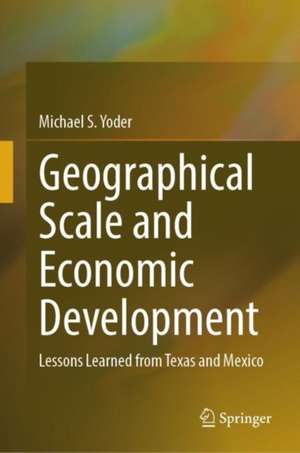Geographical Scale and Economic Development: Lessons Learned from Texas and Mexico
Autor Michael S. Yoderen Limba Engleză Hardback – 22 iul 2023
The book is a set of narratives that combine descriptions of the evolution of commercial transportation systems, economic promotion in selected communities, and corresponding changes in the built environment. It is organized into three sections, each of which corresponds to a different scale at which economic development functions: macro, regional, and local.
Preț: 697.47 lei
Preț vechi: 820.55 lei
-15% Nou
Puncte Express: 1046
Preț estimativ în valută:
133.45€ • 139.35$ • 110.21£
133.45€ • 139.35$ • 110.21£
Carte tipărită la comandă
Livrare economică 15-29 aprilie
Preluare comenzi: 021 569.72.76
Specificații
ISBN-13: 9783031361968
ISBN-10: 3031361962
Ilustrații: XIII, 168 p. 1 illus.
Dimensiuni: 155 x 235 mm
Greutate: 0.44 kg
Ediția:1st ed. 2023
Editura: Springer International Publishing
Colecția Springer
Locul publicării:Cham, Switzerland
ISBN-10: 3031361962
Ilustrații: XIII, 168 p. 1 illus.
Dimensiuni: 155 x 235 mm
Greutate: 0.44 kg
Ediția:1st ed. 2023
Editura: Springer International Publishing
Colecția Springer
Locul publicării:Cham, Switzerland
Cuprins
Chapter 1. Background to Case Studies in Geographical Scale and Economic Development.- Chapter 2. Binational Trade and Economic Development: U.S.-Mexico Steel Trade Since 1940.- Chapter 3. Inland Ports of Mexico and the Geography of Intermodal Shipping.- Chapter 4. Ports-To-Plains: A Case Study in Cargo Transport Infrastructure Policy and Planning.- Chapter 5. Case Studies in Freight Transport Geography: Four West Texas Industrial Rail Facilities.- Chapter 6. Victoria and Brownsville: Regional Transportation and the Development of Two South Texas Maritime Ports.- Chapter 7. Economic Development, Land Use, and Commercial Transportation in Two Small Cities of South Texas: Beeville and Gonzales.- Chapter 8. Small-City Economic Development in Southwest Texas: Uvalde and Sonora.- Chapter 9. Geography and Economic Development: Lessons Learned.
Notă biografică
Michael S. Yoder (Ph.D.) is an academic geographer with 28 years of teaching experience in the discipline, and 34 years of research experience in the geography of economic development, agricultural geography, urban geography, transportation, and community assessments. Michael holds doctoral and master’s degrees in agricultural geography from Louisiana State University and the University of South Carolina, respectively, and a bachelor’s degree in marketing from the University of Houston. His published academic articles and book chapters are primarily case studies involving field and archival research on suburbanization in the U.S. and Mexico, social housing and industrial development in Mexico, transportation corridors and interior ports in the U.S and Mexico, and policy related to economic development. Michael’s regional specializations include the American South, northern Mexico, South Texas, the U.S.-Mexico border, and Central America. His teaching focuses on urban planning, political geography, the geography of Latin America, economic development, and world regional geography. He has served on several municipal and county advisory boards in Texas and Arkansas related to transportation infrastructure and urban planning.
Textul de pe ultima copertă
This book is an attempt to bridge the academic discipline of economic geography with the professional field of economic development. Through case studies of economic development, it illustrates two fundamental concepts of the sub-discipline of economic geography: scale and spatial connections. It demonstrates some of the ways that economic development policies and plans are linked globally, nationally, regionally, and locally. It ties together several studies of communities and transportation systems in Texas and Mexico carried out from the late 2010’s through 2021. The studies shed light on the need to study economic development at multiple scales and to do so through blended qualitative research methods that include conversations with economic development stakeholders, published data, news content from the business and trade media, and direct observation of the built environment.
The book is a set of narratives that combine descriptions of the evolution of commercial transportation systems, economic promotion in selected communities, and corresponding changes in the built environment. It is organized into three sections, each of which corresponds to a different scale at which economic development functions: macro, regional, and local.
The book is a set of narratives that combine descriptions of the evolution of commercial transportation systems, economic promotion in selected communities, and corresponding changes in the built environment. It is organized into three sections, each of which corresponds to a different scale at which economic development functions: macro, regional, and local.
Caracteristici
Provides a focus on the operation of economic development and related policies at different scales Provides a focus on Texas-Mexico, an historically binational region exhibiting a high degree of international trade Includes case studies of “regular” places rather than familiar, noteworthy places already adequately studied
